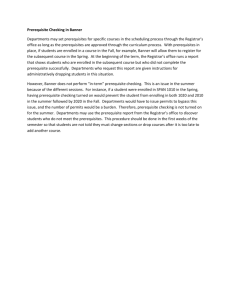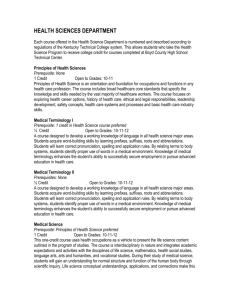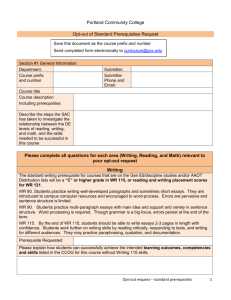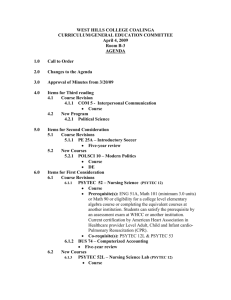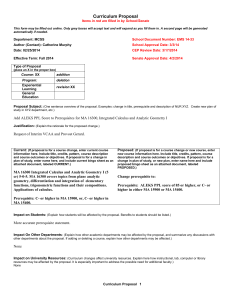CIS/MIS (92)
advertisement
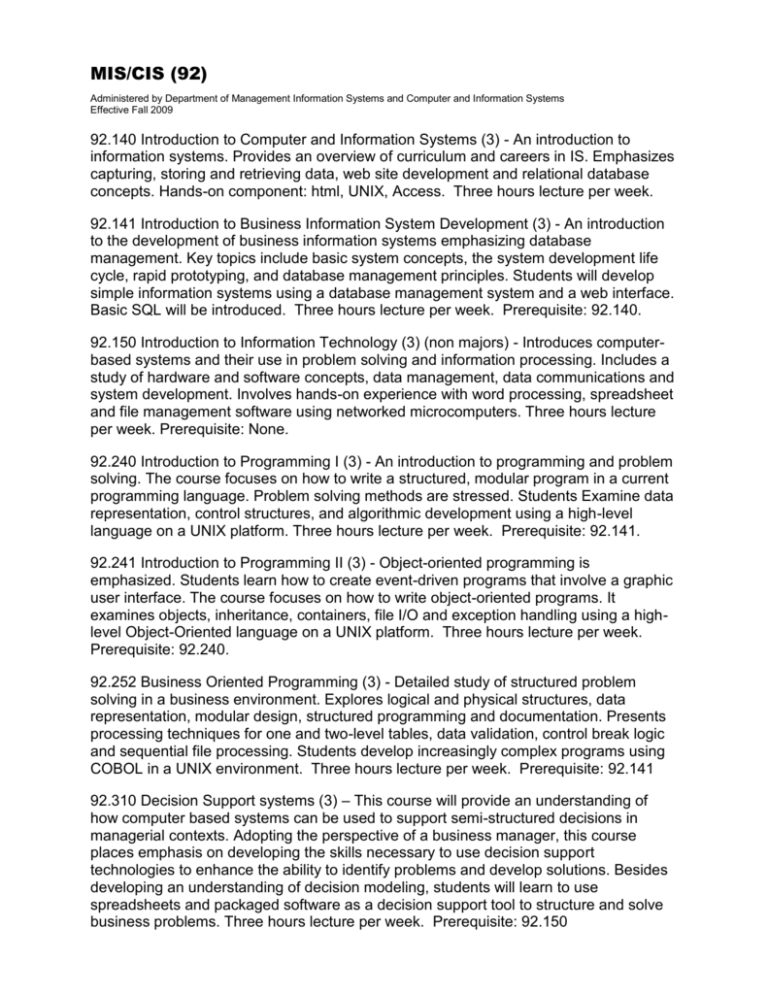
MIS/CIS (92) Administered by Department of Management Information Systems and Computer and Information Systems Effective Fall 2009 92.140 Introduction to Computer and Information Systems (3) - An introduction to information systems. Provides an overview of curriculum and careers in IS. Emphasizes capturing, storing and retrieving data, web site development and relational database concepts. Hands-on component: html, UNIX, Access. Three hours lecture per week. 92.141 Introduction to Business Information System Development (3) - An introduction to the development of business information systems emphasizing database management. Key topics include basic system concepts, the system development life cycle, rapid prototyping, and database management principles. Students will develop simple information systems using a database management system and a web interface. Basic SQL will be introduced. Three hours lecture per week. Prerequisite: 92.140. 92.150 Introduction to Information Technology (3) (non majors) - Introduces computerbased systems and their use in problem solving and information processing. Includes a study of hardware and software concepts, data management, data communications and system development. Involves hands-on experience with word processing, spreadsheet and file management software using networked microcomputers. Three hours lecture per week. Prerequisite: None. 92.240 Introduction to Programming I (3) - An introduction to programming and problem solving. The course focuses on how to write a structured, modular program in a current programming language. Problem solving methods are stressed. Students Examine data representation, control structures, and algorithmic development using a high-level language on a UNIX platform. Three hours lecture per week. Prerequisite: 92.141. 92.241 Introduction to Programming II (3) - Object-oriented programming is emphasized. Students learn how to create event-driven programs that involve a graphic user interface. The course focuses on how to write object-oriented programs. It examines objects, inheritance, containers, file I/O and exception handling using a highlevel Object-Oriented language on a UNIX platform. Three hours lecture per week. Prerequisite: 92.240. 92.252 Business Oriented Programming (3) - Detailed study of structured problem solving in a business environment. Explores logical and physical structures, data representation, modular design, structured programming and documentation. Presents processing techniques for one and two-level tables, data validation, control break logic and sequential file processing. Students develop increasingly complex programs using COBOL in a UNIX environment. Three hours lecture per week. Prerequisite: 92.141 92.310 Decision Support systems (3) – This course will provide an understanding of how computer based systems can be used to support semi-structured decisions in managerial contexts. Adopting the perspective of a business manager, this course places emphasis on developing the skills necessary to use decision support technologies to enhance the ability to identify problems and develop solutions. Besides developing an understanding of decision modeling, students will learn to use spreadsheets and packaged software as a decision support tool to structure and solve business problems. Three hours lecture per week. Prerequisite: 92.150 92.346 Data and Information Structures (3) - Studies standard data and file structures and algorithms for creation and manipulation of these structures. Explores rationale for use of structures under varying circumstances from both a practical and theoretical perspective. Involves computer exercises implementing selected algorithms in a suitable high-level language on a UNIX platform. Three hours lecture per week. Prerequisite: 92.241 92.351 Systems Analysis and Design (3) - Provides an opportunity to bring together experiences in CIS courses, other business courses and life in general to develop information systems. Helps develop skills required for successful business system development. Three hours lecture per week. Prerequisites: 92.240 or 92.252. 92.352 Advanced Business Programming (3) – Presents advanced concepts of programming in COBOL with major emphasis on indexed sequential files, interactive programming, subroutine linkage, random files and SQL RDBMS programming concepts. Three hours lecture per week. Prerequisites: 92.252. 92.353 Management Information Systems (3) - A study of how computer-based information systems provide information for effective decision making. Includes: structured analysis, design techniques, database concepts, person-machine interaction, data retrieval and telecommunications. The course focuses on the use of information technology to improve modern business decision-making. Three hours lecture per week. Prerequisites: 92.150. 92.354 Data Base Processing Systems (fall) (3) - Details and examines data base terminology organization and models. Analysis, design and administration of a relational data base explored through applicable programming experiences. Three hours lecture per week. Prerequisite: 92.241 92.356 Operating Systems (fall) (3) - Presents an overview of operating systems including real and virtual operating systems and communications software and techniques. Includes diagnostic facilities, utility routines and system commands. Provides a detailed look at UNIX. Three hours lecture per week. Prerequisite: 92.241. 92.358 Data Communication Systems (spring) (3) - Data communications terminology, technology and the functional characteristics of communications hardware and software detailed and explored. Emphasizes systems and programming considerations as related to a commercial environment. Three hours lecture per week. Prerequisite: 92.241 92.364 Fundamentals of Electronic Commerce (spring) (3) - This course explores the rapidly-growing field of Electronic Commerce (EC). The communications infrastructure required to implement EC will be studied, particularly the Internet. The related issues of transaction security and privacy will be explored. Consumer-oriented EC will be studied. Students will explore how businesses are utilizing EC to gain a competitive advantage. Three hours lecture per week. Prerequisite: 92.354 92.365 Core Concepts in Business I (3) – This is the first of a two-part series aimed at providing a thorough coverage of core concepts and techniques in Business for students of any major. This course is devoted to covering the theories and concepts from different functional areas of Business. Specifically, this course is devoted to covering core concepts from the areas of Management, Economics, and Marketing. Fundamental concepts from Ethics, Business Law, Finance and Accounting are also addressed. Prerequisites: Must have earned at least 60 credit hours with a cumulative GPA of 2.5 or better. 92.366 Core Concepts in Business II (3) – Three hours lecture per week. This is the second of a two-part series aimed at providing a thorough coverage of core concepts and techniques in Business for students of any major. This course is devoted to covering the basic theories and concepts from different functional areas of Business specifically, Business Statistics, Finance, Financial Accounting, and a few select topics from Operations Management. Prerequisites: 92.365. 92.370 Ethical Issues in Information Systems (fall) (3) – The course aims to provide the student with the necessary background relating to the concepts, theory and practice of ethics in information systems. The aim of the course is to study: (a) the frameworks for ethical decision-making (b) the methodologies that could be used to evaluate different decisions and to reach ethically responsible decisions. Three hours lecture per week. 92.371 Modeling and Simulation for Business (3) - This course introduces the fundamentals of system design, modeling, and simulation. It emphasizes advantages and limitations of various modeling techniques for different applications. Computer techniques for simulating the behavior of business, social, biological, and physical systems (both natural and artificial systems), are discussed. Applications include, but are not restricted to production and logistics design, finance and macroeconomic modeling, environmental modeling, and social and business systems analysis. Three hours lecture per week. Prerequisites: 92.353. 92.373 Economics of Information Systems (3) - This course focuses on the new and evolving business strategies grounded in the information revolution and different approaches to applying them. The course also illustrates how various economic models apply to the field of Economics of Information Systems, Information Services and the Infrastructures for Knowledge Economies. Conceptual and practical schemas are presented with a discussion of richness vs. reach, economies of scale, integration aspects, best practices, and case study examples. Additionally, the course contains a readings component consisting of ground-breaking journal articles---both classical and contemporary. Three hours lecture per week. Prerequisites: 40.122. 92.375 Business Technologies for Operations Analysis and Management (3) - This course offers an integrated technology-based implementation of practical examples from different functional areas such as finance, marketing, and operations management. Using Microsoft Excel's extensive modeling capabilities, this course focuses on building practical real-world business models from different functional areas and solving them. Analytical and mathematical skills are reinforced in the process. Three hours lecture per week. Prerequisites: 92.353. 92.432 Internship in Computer and Information Systems (6) - An educational arrangement between the student and an approved industrial, business or government agency that provides a supervised work experience in a professional area of computer and information science. The experience relates to the academic principles and theories upon which the Computer and Information Systems curriculum is based. Prerequisites: Grade point average of 2.5 and 75 credits. 92.450 Expert Systems and Artificial Intelligence (fall) (3) - A survey of basic concepts and techniques of expert systems and artificial intelligence applied to commercial information systems. Examines knowledge acquisition, representation, storage and inference methods used in expert systems. Stresses the applications, and uses illustrations, from the business environment. Three hours lecture per week. Prerequisite: 92.241 92.456 Managerial Computer Applications (3) – Provides practical experience in analysis of business problems. Features advanced techniques and concepts of systems analysis and design along with soft5ware engineering with major emphasis on management information systems and decision support systems. Uses team approach to analyze, design, and document realistic systems. Uses project management methods, project scheduling and control techniques, formal presentations, and group dynamics. Three hours lecture per week. 92.460 Advanced Systems Development I (fall) (3) - First of a two-semester course sequence during which students will work on teams to analyze a business problem and design and implement a computer-based solution. During the first semester, project management techniques and tools will be covered. Students will work in teams to implement the solution to a business problem. Three hours lecture per week. Prerequisite: 92.346 and senior standing. 92.461 Advanced Systems Development II (spring) (3) - Second of a two-semester course sequence during which students will work on teams to analyze a business problem and design and implement a computer-based solution. Students will work in teams to implement the solution to a business problem developed in 92.460. The team will make a presentation of its project to a group of IS professionals. Three hours lecture per week. Prerequisite: 92.460. 92.474 System Development (3) - This is a cornerstone course during which students will work on teams to analyze a business problem and design and implement a computer-based solution to the business problem. During the course, project management techniques and contemporary system development tools, necessary for the development, will be covered. Prerequisite: 92.354 and senior standing. Three hours lecture per week. Prerequisite: 92.354. 92.475 Information Age Organization (3) - This course aims to deliver a theoretically and conceptually informed analysis of the impact of information systems on organizations and organizational strategies. It covers theoretical and practical aspects of managing information processes in order to enable organizations to learn and adapt in an increasingly volatile information environment. In terms of theory, it introduces conceptual frameworks for the management of organizational information processes at a strategic level. On the practical side, the course introduces methods and tools that organizations may consider to enhance their management and use of information. Three hours lecture per week. Prerequisites: 92.353. 92.498 Special Topics (3) - Examines current or advanced issues in the field of computer and information systems not normally examined in depth in other courses. Three hours lecture per week. 92.550 Information Processing (3) - A comprehensive introduction and basic orientation to the use of information processing in the educational environment. Students are required to investigate the impact of the computer and associated peripheral devices on the classroom. Emphasis is placed on the effective use of available computer resources. Prerequisite: Graduate standing. Three hours lecture per week. 92.554 Management Information Systems (3) - Studies information analysis and systems design from the user's point of view. Students identify the basic concepts of information systems, information flow and the nature of management information systems. Data bases and data base management systems will be investigated from the manager's perspective. Prerequisite: Graduate standing. Three hours lecture per week.
